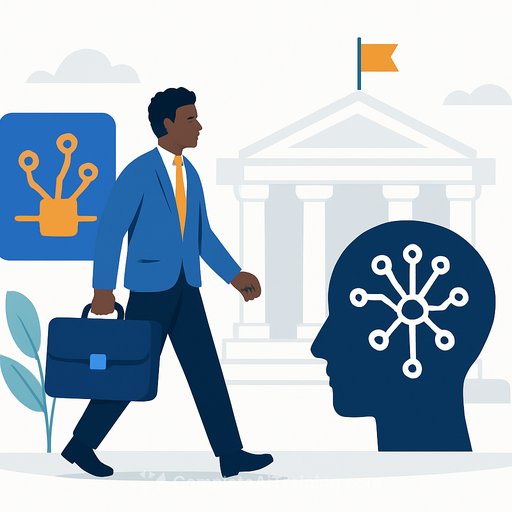Abu Dhabi launches the world's first AI public servant at GITEX Global 2025
Dubai, UAE - October 13, 2025 - Abu Dhabi introduced "TAMM AutoGov," an AI public servant that automates recurring government services as part of the TAMM 4.0 platform. The goal is clear: move from reactive service delivery to proactive, human-centered administration and become an AI-native government by 2027.
For public sector leaders, this is a practical blueprint for automation at scale. AutoGov handles high-volume tasks in the background, reduces administrative load on agencies, and sets measurable standards for convenience, speed, and cost-to-serve.
What AutoGov does today
- Automates renewals, utility payments, and healthcare appointments without manual initiation.
- Lets residents set preferences and consent for automation inside TAMM 4.0.
- Orchestrates 1,100+ public and private services through a single access point.
- Predicts user needs and triggers services without forms or repeated applications.
- Provides multilingual, contextual assistance via the integrated TAMM AI Assistant.
- "Snap and Report" routes citizen photos of issues directly to relevant authorities.
Under the hood
TAMM 4.0 is built on Microsoft Azure OpenAI Service and G42 Compass 2.0, with models including JAIS, a high-performing Arabic large language model. Over 100 AI use cases run across 40+ entities, from real-time economic analysis to workforce planning.
The strategy targets full AI integration across services and 100% sovereign cloud adoption by 2027. This is a shift from transactional portals to an anticipatory, unified "super app" experience.
Market and vendor implications
Backed by Dh13 billion ($3.54 billion) in digital infrastructure, the program strengthens Abu Dhabi's partnership with Microsoft (NASDAQ: MSFT) and G42. Microsoft's $1.5 billion investment in G42 and a joint $1 billion developer fund signal a long-term platform bet on public sector AI.
First-mover advantage favors integrated platform providers. Competitors like Amazon Web Services (NASDAQ: AMZN) and Google Cloud Platform (NASDAQ: GOOGL) may face higher barriers to securing end-to-end government deals. Expect shifts in vendor portfolios as siloed solutions give way to platform-led automation.
Why this matters for governments
- Citizen outcomes: Reduced friction, fewer forms, faster resolutions, 24/7 consistency.
- Agency productivity: Automation handles repeatable work; staff focus on exceptions and policy.
- Policy feedback loop: Real-time data on service usage and outcomes informs decisions.
- Standardization: One platform, shared patterns, and reusable components across entities.
Risks and safeguards to prioritize
- Data privacy and consent: Clear opt-in/opt-out controls; purpose limitation; minimization by default.
- Security: Sovereign cloud, zero-trust architecture, continuous monitoring, red teaming, and tested incident response.
- Algorithmic fairness: Bias testing, explainability, audit trails, appeal mechanisms, and human oversight for sensitive decisions.
- Resilience: High availability targets, disaster recovery, offline contingencies for essential services.
- Digital inclusion: Assisted channels, mobile-first design, language support, and digital literacy programs.
- Vendor lock-in: Open standards, portable data formats, and exit clauses in contracts.
Operating model and KPIs that matter
- Time saved per resident (minutes/month) and cost-to-serve per transaction.
- Auto-completion rate for eligible tasks and exception rate requiring human review.
- Accuracy/error rate, appeal rate, and outcomes by demographic segments.
- Uptime/SLA adherence, model drift alerts, and latency.
- Citizen ease score and satisfaction (CSAT) per service.
Governance should include a cross-agency AI council, a model risk committee, and a product operations team with clear RACI across policy, data, security, procurement, and service owners. Abu Dhabi reports 95% of its 30,000+ government employees have completed AI training-an indicator that workforce readiness is non-negotiable.
Roadmap highlights
- Near term: Full AutoGov deployment; "AI Vision" for document and image-driven workflows; "Smart Guide" for step-by-step cues.
- Service organization: TAMM Spaces such as Family, Mobility, and Sahatna (health) aligned to life events.
- By 2027: 100% sovereign cloud, comprehensive AI integration, and TAMM Nexus to accelerate new service rollouts by 70-80%.
- Potential expansions: Proactive life-event management, smart urban planning, personalized healthcare and education, and enhanced public safety.
What public sector leaders can do next
- Build a prioritized automation backlog: renewals, payments, certificates, scheduling, status checks.
- Establish data foundations: inventories, lineage, quality rules, retention schedules, and consent records.
- Stand up an AI control framework: model governance, testing gates, policy-on-a-page for staff.
- Run a pilot in one high-volume service with opt-in automation and clear success metrics.
- Integrate with IAM for secure identity, permissions, and delegated consent.
- Update procurement: open APIs, portability, security attestations, bias audits, and uptime penalties.
- Launch workforce programs: role-based training, change champions, and incentives tied to automation outcomes.
Economic and ecosystem effects
Abu Dhabi projects 5,000+ jobs and AED 24 billion in GDP contribution by 2027. A unified digital infrastructure and the developer fund create pathways for startups in data analytics, AI security, integration, and vertical solutions to plug into TAMM.
As resident expectations shift, other governments will accelerate their AI plans. The bar is moving from portals and chatbots to automated execution of routine services with strong guardrails.
Bottom line
TAMM AutoGov marks a practical step-change for government service delivery: automate recurring tasks, keep humans for exceptions, and measure outcomes relentlessly. For agencies, the playbook is clear-start with repeatable transactions, build consent and controls into the core, and scale through a unified platform.
Skills and training
If you are building your internal capability, structured programs help teams move fast without rework. Explore role-specific pathways and certifications below.
Your membership also unlocks:






